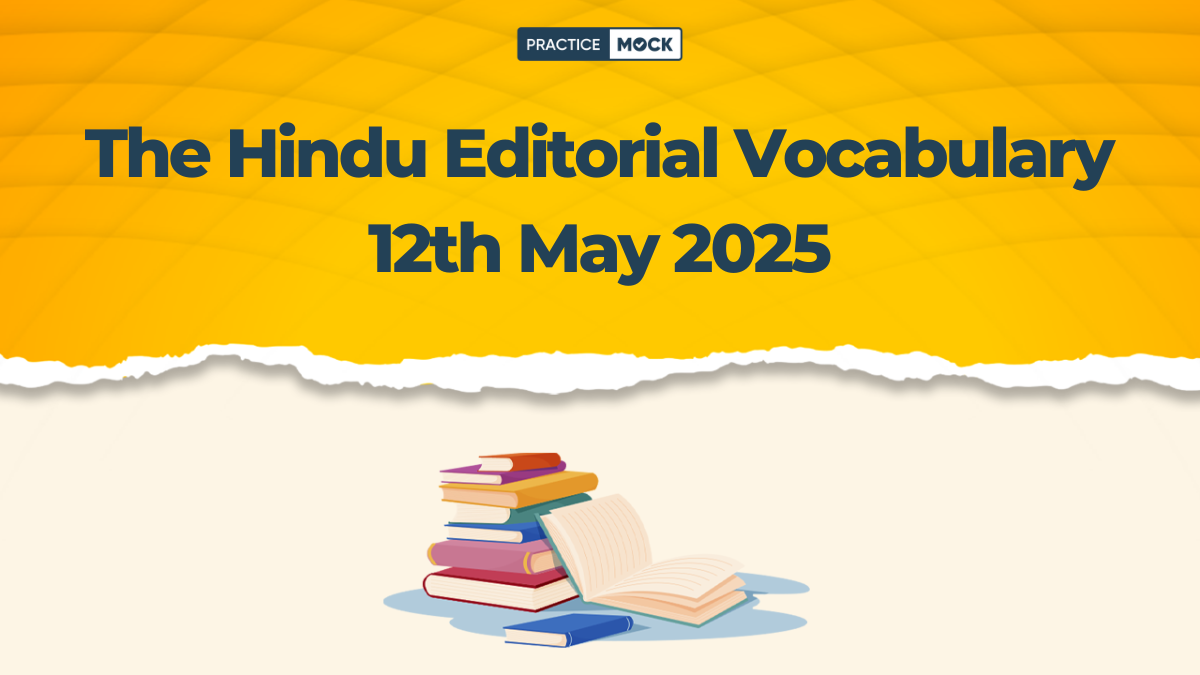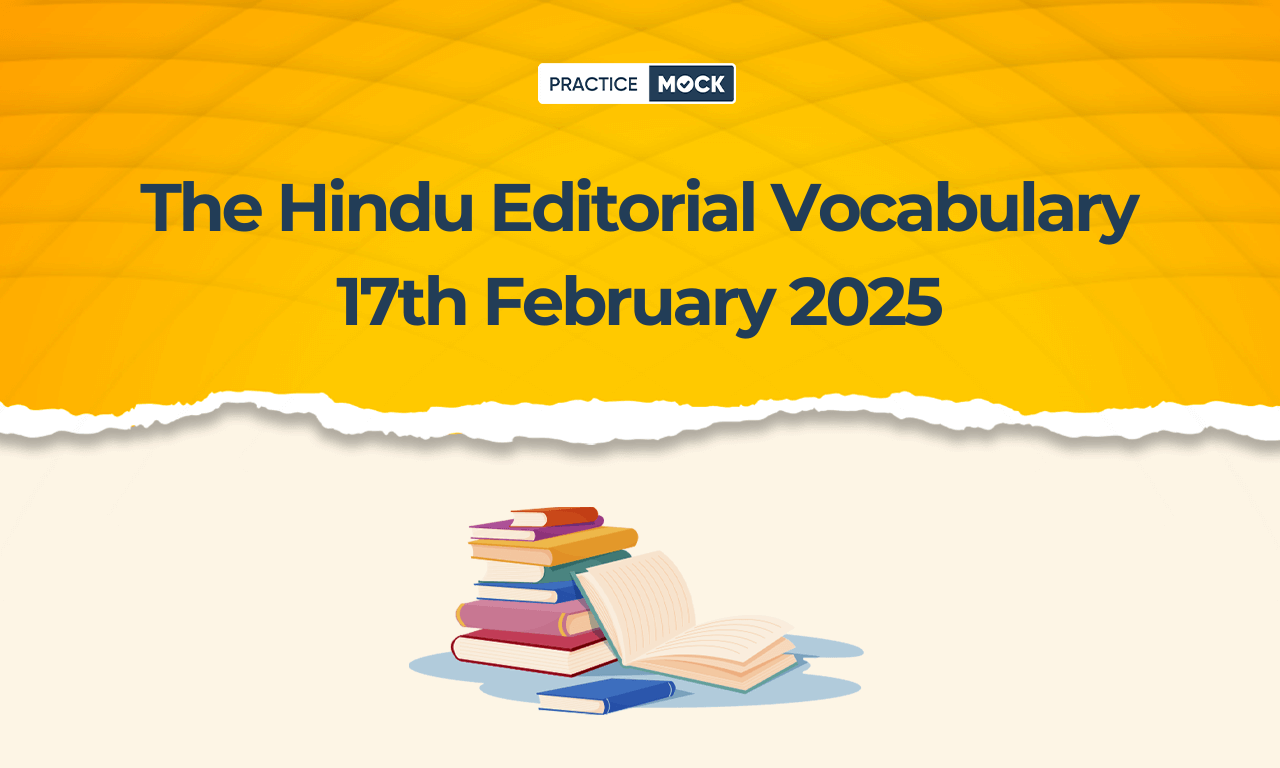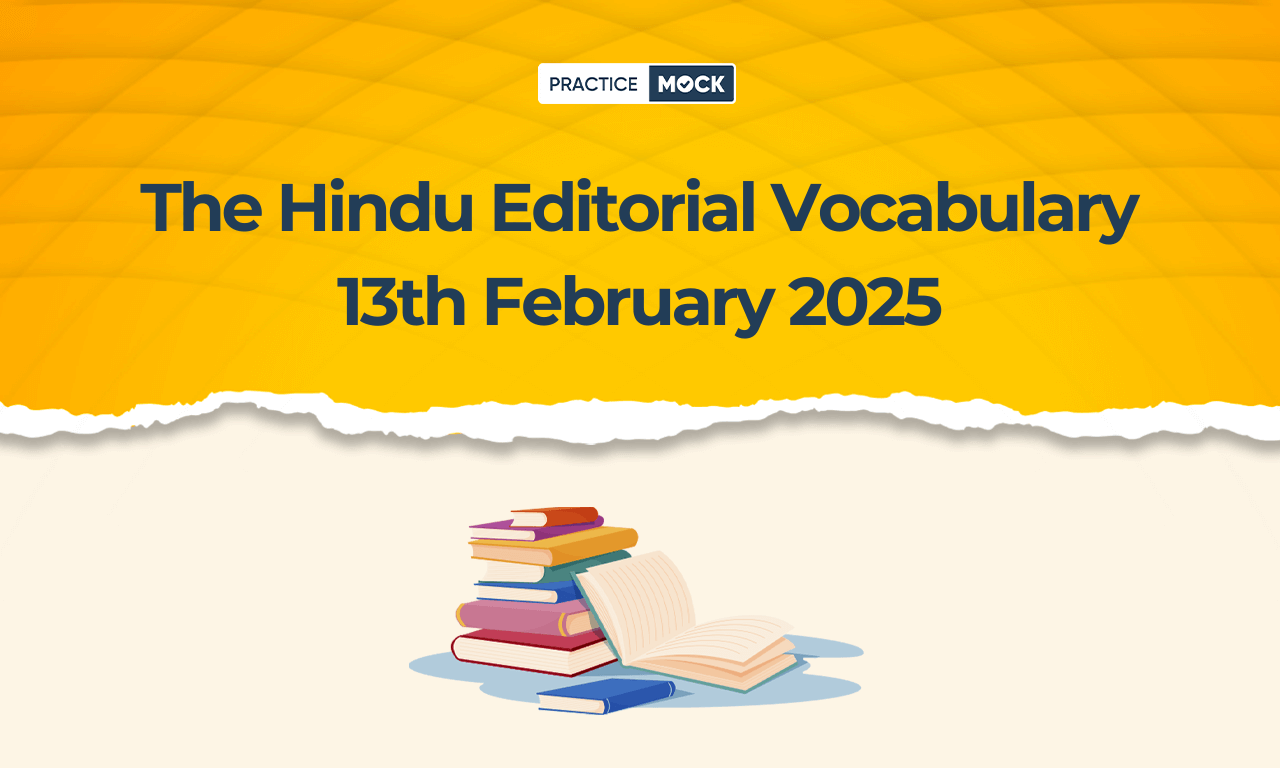The Hindu Editorial Vocabulary 19th October 2024


The Hindu Editorial Vocabulary 19th October 2024 is an effective tool for regularly learning new words and their contextual meanings. Candidates can utilize this free resource daily to improve their vocabulary knowledge, especially those preparing for government exams like the IBPS PO, SBI Clerk, SSC, and Others.
Go ahead and start building your vocabulary power.
Fate of nations: On the 2024 Economics Nobel
–The 2024 Nobel recognises the need for ‘inclusive’ institutions
The 2024 economics Nobel prize is an important one as it highlights what really matters at the end of the day for the long-term economic success of any country. U.S. economists Daron Acemoğlu, Simon Johnson and James A. Robinson were rewarded for their work on how the quality of institutions (established laws or practices) in a country can lead it either down the path of economic prosperity or abject (extreme or hopeless) poverty. Their study was on the effects of colonialism (control by one country over another) on the quality of institutions and post-colonial growth of various countries. They found that countries with institutions that secured the rule of law and enforced property rights (legal rights to own and use property) offered individuals a strong incentive (motivation or encouragement) to work, save, and invest in the long run. On the other hand, countries with extractive (exploitative or taking without giving back) institutions, which gave rise to concentration of power (gathering of control in a few hands) and constrained political freedoms, suffered deep economic pain. Some have pointed to the authors’ lack of a substantial critique of the brutality (extreme cruelty or harshness) of colonialism and of painting too rosy a picture of the development of Western institutions. But the salience (importance or relevance) of their analysis remains.
The “institutions” that the laureates talk about as crucial to long-term economic prosperity are nothing but the various rules, which could be either explicit laws or implicit social norms that govern human interaction in society. Such institutions may also include laws that protect citizens from expropriation (taking away property by authority) by the government. The rapid economic growth of China and India since their economic liberalisation (removal of restrictions on the economy) in the late 1970s and the early 1990s, respectively, are good examples of countries prospering soon after a significant change in the nature of the institutions or the “rules of the game” that governed their economies. Structural (related to the organization or framework) reforms that further improve the quality of institutions are thus crucial if these economies are to achieve living standards similar to those of high-income developed countries in the West. Notably, the Nobel also comes at a time when existing institutions around the world are under the significant threat of being destabilised (made unstable or insecure) by personality-driven populist movements. It is worth noting that in their work, the Nobel laureates have classified democracy as an important “inclusive” institution that is good for long-term economic growth. However, the rise of illiberal (restrictive of freedom) democracies with protectionist economic policies in recent years shows that liberal institutions that work for the upliftment (improvement or betterment) of the many, and development not just for a few, are now under severe threat. A democracy driven by short-term populist policies can be as “extractive” as an autocracy (system of government by one person with absolute power) that serves the interests of a narrow elite that is close to people in power.
Hindu Vocab Wordlist 19th October 2024
Upskill yourself and enhance your vocabulary knowledge. Candidates should begin learning new words daily with Hindu Editorial Vocabulary on 19th October 2024.
- Institutions: (noun) Established laws, practices, or customs in society or a community.
- Abject: (adjective) Extremely bad, unpleasant, and degrading; showing no pride or respect.
- Colonialism: (noun) The practice of acquiring control over another country, occupying it with settlers, and exploiting it economically.
- Property rights: (noun) The legal right to own, use, and dispose of property.
- Incentive: (noun) Something that encourages or motivates a person to do something.
- Extractive: (adjective) Taking resources or value from something without giving much back, often used in a context where something is exploited.
- Concentration of power: (noun phrase) The control of authority or decision-making in a few hands or a single group.
- Brutality: (noun) Savage physical violence; great cruelty.
- Salience: (noun) The quality of being particularly noticeable or important; prominence.
- Expropriation: (noun) The act of a government taking away private property for public use, often without fair compensation.
Hindu Vocab Master 19th October 2024 with Synonyms & Antonyms
Here are the synonyms and antonyms of all the difficult words in Hindu Vocab Master for 19th October 2024:
| Word | Synonyms | Antonyms |
| Institutions | Organizations, Systems, Structures, Establishments | Disorganization, Disorder, Chaos, Anarchy |
| Abject | Wretched, Degraded, Miserable, Hopeless | Noble, Exalted, Dignified, Honorable |
| Colonialism | Imperialism, Expansionism, Hegemony, Occupation | Decolonization, Independence, Autonomy, Liberation |
| Property rights | Ownership, Title, Entitlement, Possession | Dispossession, Confiscation, Seizure, Forfeiture |
| Incentive | Motivation, Stimulus, Encouragement, Inducement | Deterrent, Discouragement, Hindrance, Disincentive |
| Extractive | Exploitative, Draining, Consuming, Exhaustive | Sustainable, Restorative, Replenishing, Giving |
| Concentration of power | Centralization, Domination, Control, Monopoly | Distribution, Decentralization, Sharing, Democracy |
| Brutality | Cruelty, Savagery, Violence, Harshness | Kindness, Compassion, Humanity, Gentleness |
| Salience | Prominence, Importance, Significance, Distinction | Insignificance, Inconspicuousness, Unimportance, Negligibility |
| Expropriation | Confiscation, Appropriation, Seizure, Requisition | Restoration, Return, Compensation, Surrender |
Recent Posts
High-Scoring Topics in IBPS PO Exam 2025, Check Weightage
Check out high-scoring topics for IBPS PO 2025. Check topic-wise weightage for Quant, Reasoning, English…
180-Day IBPS PO Prep Timeline for Prelims, Mains & Interview
Follow this proven 180-day strategy to prepare for IBPS PO Prelims, Mains, and Interview with…
Most Repeated Floor Based Puzzle Questions for RRB PO 2025, Check How to Solve it Speedily?
Here we are providing the Most Repeated Floor Based Puzzle Questions for RRB PO 2025…
RRB ALP Vacancy 2025-26 Out for 9970 Posts, Notification Expected Soon
The RRB has released the RRB ALP Vacancy 2025-26 for 9970 Posts. This blog has…
SSC CGL Previous Year Question Paper in Form of Free Quiz and PDF
This blog has provided the SSC CGL Previous Year Question Paper in the form of…
500 SSC CGL Repetitive One-Word Substitutions
In this blog, we have provided the 500 SSC CGL Repetitive One-Word Substitutions PDF to…


